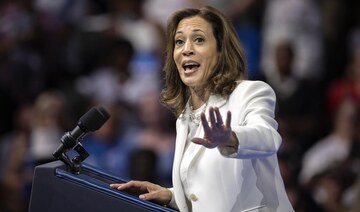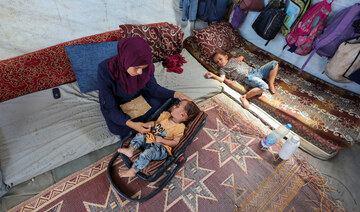LONDON: An art exhibition “addressing Arab pasts to imagine futures full of solidarity, progress and unity” has debuted at a gallery in London, drawing people from different Arab backgrounds, according to the artist.
Born in Los Angeles, Massoud Hayoun draws upon his Tunisian, Moroccan and Egyptian heritage to explore notions of belonging, identity and systems of power through his work, exhibiting 14 canvases drawn from his critically acclaimed memoir “When We Were Arabs: A Jewish Family’s Forgotten History,” published in 2019 by The New Press in New York.
“His evocative portraits, painted as though they were drawn using a blue-ink ballpoint pen, celebrate the complexity of society at its fullest, featuring convicts, sex workers and migrant laborers while also paying homage to the people who raised him: his Egyptian and Tunisian grandparents,” the London-based Larkin Durey gallery said in a statement.
The exhibition, entitled “Between Broken Promises, Harissa,” which is set to conclude on Friday, was listed as one of “the coolest things to do in London this week” by British GQ magazine when it opened on May 9.
“I wrote a book on Arab identity in 2019 in which I ask what Arabness is and apply that to the lives of my grandparents, who raised me ... and I felt it was important to share our little political theories with the world,” Hayoun told Arab News.
“Those ideas reflect largely in these works. Our family is of Jewish faith, but like many believers in Arabism of diverse backgrounds, our Arabness is paramount. It supersedes but does not cancel out any simultaneous identity,” he added.
The death of Hayoun’s grandparents, with whom he was especially close, led him to interrogate his Jewish Arab roots as, for the 36-year-old artist, “politics are personal, and the more people benefit from certain oppressive power structures, the less likely they are to notice ... the degree to which all politics are personal.”
Similarly, his two poetic novels, “Building 46” and “Last Night in Brighton,” both published by Darf Publishers in London, use the framework of the ghost story to examine body image, migrant laborers, and the North African diaspora.
“As a journalist, Hayoun was drawn to ‘help uplift voices — not just those of analysts and academics, but on many occasions of people who are systematically silenced,’ and personal loss, the pandemic and the example of his grandmother taking up drawing late in life, inspired Hayoun to focus on painting, a language he has always enjoyed as an immediate, visceral way in which to tell stories,” the gallery said.
His portraits are painted as though drawn using a blue ballpoint pen, which Hayoun described as “blue faces with highlights look ethereal and ghostly, and I’m often painting about people who are either passed away or set in the past or distant history.
“But, as with all art and literature, there are no invalid interpretations. Their interpretations will certainly influence my work going forward,” he said.
“The works in this show are about Arabness — not Jewish Arabness or any particular Arab community. With the news as it is, it is radical to envision bright Arab futures,” Hayoun explained.
Having already toured the US and almost concluding his UK exhibition, the artist said he is now in the process of talking to several galleries and museums to show more in Arab and Gulf countries instead of being “in the position of talking about Arabs in the so-called West.”
He said: “I’m just one of very many younger people of Arab origin right now who, for a variety of reasons, are coming together to ask what Arabness was, is, and will be and that’s a pressing and prescient question with current events as they are.
“Above all the more superficial things I’m taking away from London is a community of kindred spirits thinking past the darkness of these times. That’s a hopeful thing that will fuel my practice indefinitely,” he added.

































